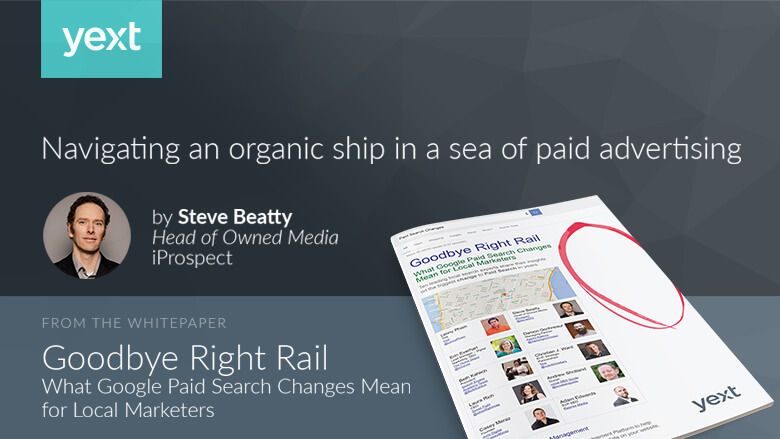Google threw the search industry a curveball in March when it announced it was removing right rail, paid search ads on desktop browsers, a move that has already had a great ripple effect on the local search community, impacting millions of advertisers, agencies, experts, and SEOs alike.
Today we're featuring agency expert Steve Beatty, iProspect's Head of Owned Media, who contributed his unique perspective (below) on the industry impact for our recent whitepaper, Goodbye Right Rail: What Google Paid Search Changes Mean for Local Marketers.
Steve Beatty, iProspect
Google began 2016 by firing a proverbial shot across the bow of the desktop SEO ship. But never fear, the organic search ship is not sunk yet. It may need a few repairs and enhancements, but it's still a sea-worthy vessel.
For a long time, the crew of the SEO ship has had clear visibility that made it easy for them to navigate into port and deliver their cargo to the customers waiting for them there. Google's recent changes have obscured the path, making it more challenging for brands to find their way to end customers. But "mobile" and "local" serve as beacons that can help you reach the port so your customers can find you.
What's Changed?
As the Search results below illustrate, the recent four-pack ad listings from Google (previously limited to only two to three Paid Ads), pushes desktop organic further and further down the page.
In the 2015 search result example, organic search results were able to at least maintain a place above the fold, just below the paid ads. In the 2016 example, the organic result has been pushed below the fold, however local results are still visible via the map that is positioned directly following the paid results.
Paid dominates above fold and local is the next result with Organic no longer visible.
iProspect Data Insights
In a recent analysis of 100 clients, the iProspect team saw an 8 percent drop in organic branded queries after the launch of this Google update. And, in some key categories such as travel, we saw a drop as high as 11 percent in non-branded queries. The graph below shows the overall trend iProspect has seen thus far following the launch of the four-pack ad.
All Is Not Lost
Despite these declines in performance, all is not lost for organic search in the sea of ads. As the 2016 search results example shows, e-commerce brands like Osh-Kosh that have implemented strategies and technology to support local listings, data aggregation, and relevant local landing pages, have ensured themselves a relevant local seat at the table. Clearly, for a massive volume keyword like "baby clothes" (90,000 monthly searches), paid sits atop the results, however local results still inhabit an important piece of SERP real estate. This demonstrates the importance Google places on the intent of the user for searching a keyword without a location (buy online or go to a store).
E-commerce brands that have physical locations but have not yet created strong local strategies and ensured that relevant data is used to deliver the best local experience (name, address, phone), data aggregation, and local content, have work to do.
Final Thoughts
E-Marketer predicts there will be 141 billion mobile local searches [JW2] by 2019, brands should have this as an essential go to market strategy. As we become an even more mobile-centric society, a local search strategy should be a key part of any e-commerce business whether it has real world locations or not.
Local content should be developed to support local users engaging with your business and local infrastructure should be in place to support digital presence and scale. If brands fail to recognize these needs, they risk getting lost in a sea of paid ads and never finding their customers.
Download the full white paper today to read more industry expert opinions on Google's recent developments, the impact these developments are having on the local search community, and how you can optimize your digital presence to make sure your business always appears at the top of search results.

